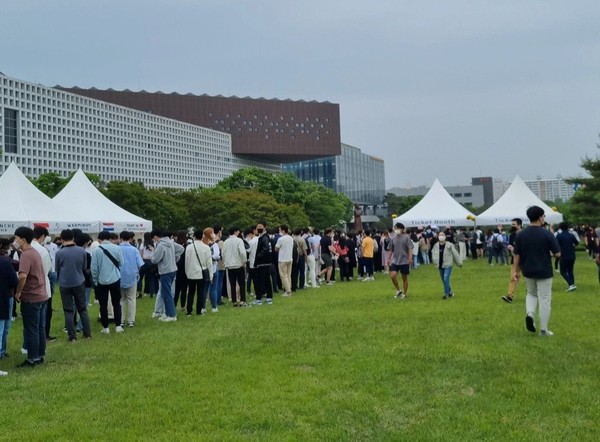On May 14, the international food festival was organized and hosted by the KAIST International Students Association with support from the International Scholar and Student Services, held in front of the Academic Cultural Complex. As a traditionally annual occurrence, hosted for the second time since its brief cancellation during the peak of Covid-19, the food festival aimed to publicize and celebrate the diverse range of countries that KAIST’s international students originate from. 18 different tents were present, each representing either a country directly or indirectly through clubs. The stands included: Mazedaar Food Heaven, KISA, Balkanche, Savoury Vish, MoonKnight, MAMMA MIA, Desi Dhaaba, Silver Lining, French Fleischpflanzerl, VN.KAIST, Damndi, Maryse et Cul de Poule, Warmindo, Land of Fire, Team NL, Oh! My Thai, Nomads and Real Mexican Taquito.

Each stand was funded 300,000 KRW to prepare supplies and ingredients, with each team being able to bring back any profits that were made above this initial funding. Though the event was viewed widely as a success, allowing both international and Korean student attendees alike to try foods from many different cultures, one problem seemed to be prominent throughout the festival. Purchasing food directly from stands was made impossible, instead requiring the purchasing of monetary tokens from the center, which could then be exchanged for foods from each stand then re-exchanged to the organizers for the money; despite this possibly being a good alternative to keeping track of all the money that was raised by the event, as well the prevention of the possibility of fraudulent actions taken by each group, this led to some logistical issues for festival’s attendees. Namely, many students were unable to purchase any food from the stalls, mainly from the fact that those who came just a little late had no choice but to stand in a very long line, which meant that by the time they were able to purchase any tokens, the stands had already run out of their stock. This also led to another problem at the end of the festival, whereby all those who were unable to use their coupons, again had to stay in line to re-exchange them for money.
International students make up a sizable number of students at KAIST, with around 10% of all students originating from countries abroad. Though the meaning of the food festival, on the outside, seems to encourage the celebration of international student identity, some controversy has arisen that seems to suggest that this festival also actively encourages some segregation between international students as a side effect, enforcing the idea that students from similar cultural backgrounds should work exclusively with others from their own countries. This problem may especially be apparent for students from nations that form only a small percentage of the international students at KAIST. Those who don’t have many peers from the same country or even completely alone may find it hard or impossible to participate in the organization of the festival itself. However, with the introduction of allowing clubs, rather than countries, to open their own stalls in the festival, it seems like a step in the right direction.

